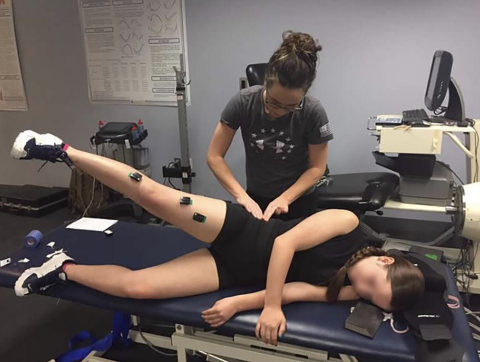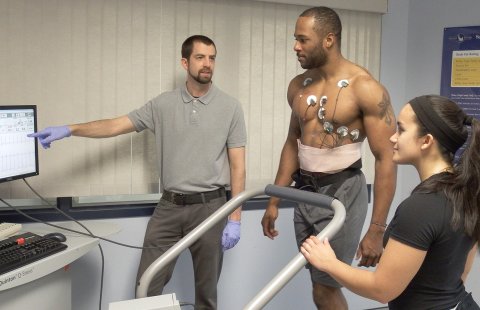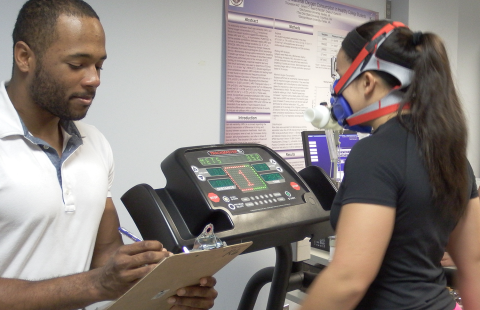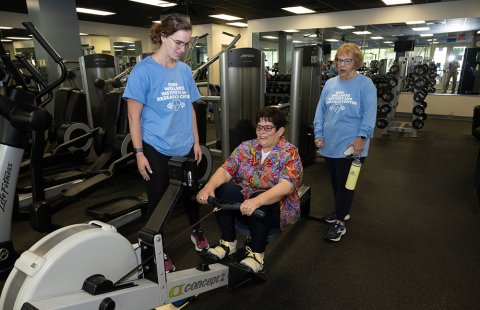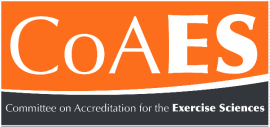About the Program
This bachelors' degree program is designed to prepare students for careers in developing exercise and wellness programs in settings such as hospitals, wellness and rehabilitation centers, sports medicine clinics, sports performance centers, collegiate sport facilities, government agencies, health and fitness centers, and corporations. Academic preparation focuses on the scientific aspects of exercise related to a variety of populations, including athletes, first responders, and individuals with chronic conditions such as cardiovascular, pulmonary and/or metabolic disease. The curriculum follows the standards of American College of Sports Medicine (ACSM) and is an accredited Exercise Science Program by The Committee on Accreditation for the Exercise Sciences (COAES) under The Commission on Accreditation of Allied Health Education Programs (CAAHEP). Upon completion of this program students are able to and commonly obtain the following certifications:
- ACSM Exercise Physiology (ACSM EP-C)
- ACSM Clinical Exercise Physiology (ACSM CEP) (*with additional clinical hours)
- National Strength and Conditioning Association's (NSCA) Certified Strength and Conditioning Coach (CSCS)
The program also contains pre-requisite coursework and serves to prepare students for graduate studies in exercise science, physical therapy, athletic training, occupational therapy and other allied health fields including ODU's Exercise Science master's degree.
Program Highlights
- Faculty: expert teacher-researchers who take pride in both endeavors
- Laboratories: high-quality facilities with state-of-the-art research equipment
- Service Learning: All students will get opportunities to practice their skills in the community through service learning projects in the coursework
- Internships: Partial and full semester internships available in areas related to the program. Many established local and non-local partnerships provided for students. Exercise Science Interns in 2024-2025 had a successful pass rate of 100%.
- Graduate school preparation: Many students go on to physical therapy, athletic training, exercise science, occupational therapy graduate programs
- Research: students are encouraged to assist with faculty research projects and to present their own research at regional and national professional associations
- Academics: in addition to Exercise Science course requirements students will choose from one of two tracks- Scientific Foundations of Exercise and Preventive/Rehabilitative Exercise
- Program Satisfaction: 97% of 2024-2025 graduates were satisfied or very satisfied with their quality of instruction in the program. 95% of the over 500 graduates over the past 5 years were satisfied or very satisfied with program instruction.
The Clinical and Research Preparation Track is designed for students desiring further education in such allied health areas as physical therapy, physician assistant training, medicine and biomedical sciences; the coursework is more rigorous as admission standards to postgraduate studies in these fields is highly competitive. The Exercise and Sport Specialist Track prepares students for careers in cardiac rehabilitation, personal training and corporate wellness and includes a semester-long internship.
The exercise science curriculum includes a clinical internship which provides professional experiences to support the academic course of study. Requirements include the completion of 400 documented hours in an approved setting and completion of pre-determined goals and objectives. In the past, students have completed internships in such prestigious settings as the US Olympic Training Center. Additional internship sites include clinical settings such as cardiac rehabilitation, physical therapy, preventive settings such as fitness and corporate wellness centers; and research settings such as human performance laboratories. The internship is a requirement for students in the Exercise and Sport Specialist track.
Requirements for program completion can be found in the catalog.
The Clinical and Research Preparation Track is designed for students desiring further education in such allied health areas as physical therapy, physician assistant training, medicine and biomedical sciences; the coursework is more rigorous as admission standards to postgraduate studies in these fields is highly competitive. The Exercise and Sport Specialist Track prepares students for careers in cardiac rehabilitation, personal training and corporate wellness and includes a semester-long internship.
The exercise science curriculum includes a clinical internship which provides professional experiences to support the academic course of study. Requirements include the completion of 400 documented hours in an approved setting and completion of pre-determined goals and objectives. In the past, students have completed internships in such prestigious settings as the US Olympic Training Center. Additional internship sites include clinical settings such as cardiac rehabilitation, physical therapy, preventive settings such as fitness and corporate wellness centers; and research settings such as human performance laboratories. The internship is a requirement for students in the Exercise and Sport Specialist track.
Requirements for program completion can be found in the catalog.
Minors
Resources
Accredited by CoAES
The baccalaureate degree program in exercise science is accredited by the Committee on Accreditation for the Exercise Sciences (CoAES)




